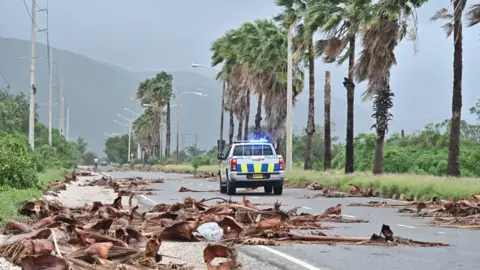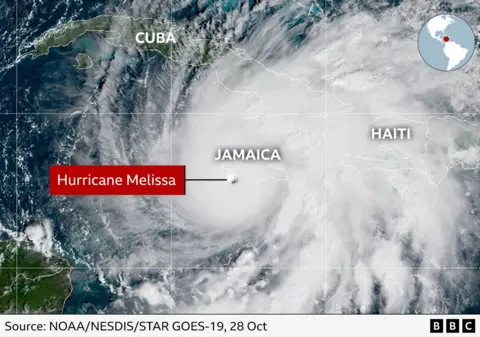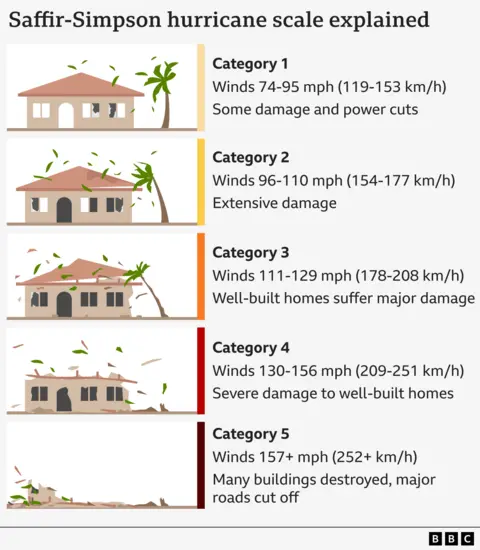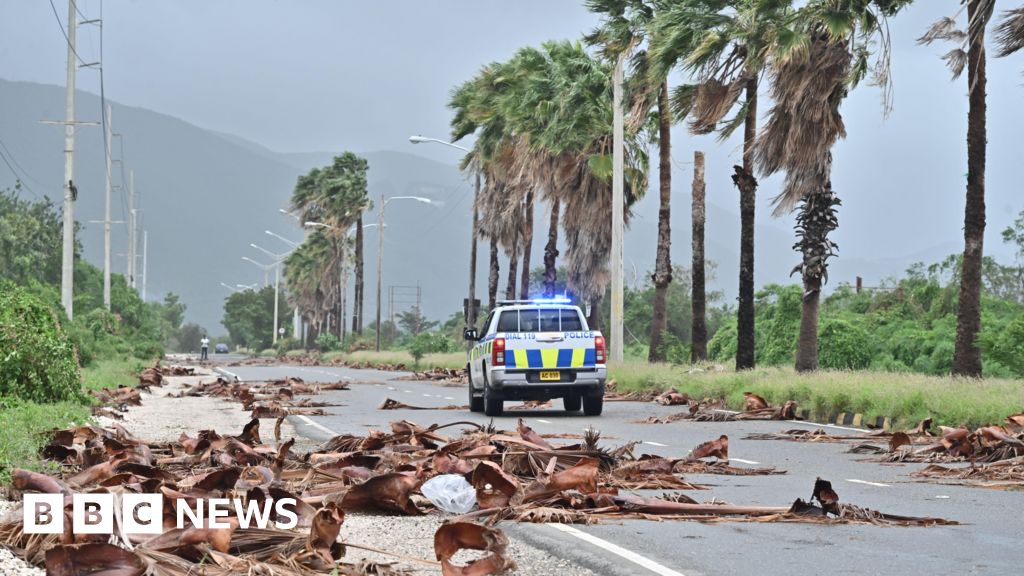Nick Davis,Kingston and
Rachel Hagan
 EPA
EPAThe true extent of Hurricane Melissa is still being revealed in Jamaica.
Without power or phone coverage, much of the country is isolated and so information is trickling through.
Three-quarters of the country had no electricity overnight, while the numbers of people injured – or perhaps dead – haven’t even begun to be counted.
Many parts of Jamaica’s western side are under water, with homes destroyed by strong winds after the hurricane tore across the island with catastrophic force.
As wind and rain lashed through the night, one local official said the destruction resembled “the scene of an apocalypse movie.”
With communications crippled, the true scale of the disaster remains unknown. Prime Minister Andrew Holness declared the island a “disaster area” late Tuesday, warning of “devastating impacts” and “significant damage” to hospitals, homes and businesses.
Although no deaths have yet been confirmed, Montego Bay’s mayor Richard Vernon told the BBC his first task at daybreak would be “to check if everybody is alive.”
Hurricane Melissa, the strongest storm to strike Jamaica in modern history, barrelled across the country on Tuesday, leaving behind a trail of ruin.
At its peak, the hurricane sustained winds of 298 km/h (185 mph) – stronger than Hurricane Katrina, which devastated New Orleans in 2005 and killed 1,392 people.
Stories of devastation are coming out – people have shared clips of roads that became rivers, mudslides on the hills, roofs being ripped from buildings and palm trees tossed like tooth picks.
In the town of Black River on the south-west coast, police officer Warrell Nicholson was sheltering in the police station along with some local people despite the building suffering damage in the storm. “It’s been devastating,” he told the AFP news agency.
Further up the coast, Andrew Houston Moncure was sheltering in the luxury hotel he owns, with his wife and 20-month-old son. At the height of the hurricane they barricaded themselves inside the shower, which they fortified with pillows and blankets.
“It was the most terrifying experience, especially with my son. The pressure is so low you struggle to breathe, and it just sounds like a freight train going over you,” he told AFP.
An MP in western Jamaica meanwhile said “it resembled the scene of an apocalypse movie”, speaking to Kingston-based journalist Kimone Francis of The Jamaica Gleaner.
Francis described the night as “stressful” and “intense”, marked by relentless heavy wind and rain.
“You don’t have a connection. You can’t speak to the people you normally speak to,” she told the BBC World Service’s Newsday programme.
Across Jamaica’s central parishes, Francis said, floodwaters rose to the roofs of two-storey homes.
One anonymous woman told the BBC: “There is water coming in through the roof of my house. I am not okay.”
While no fatalities had been confirmed, Jamaica’s prime minister told CNN he feared “there would be some loss of life”. Damage, he said, was widespread – hitting hospitals, schools, homes and businesses.

Verna Genus was sheltering from the storm at her four bedroom home in the village of Carlisle, St Elizabeth, when the hurricane ripped the zinc roof off her house.
The 73-year-old vegetable farmer was in the house with her sons and baby grandchild when the hurricane made landfall over the area.
Verna has lost communications due to the power lines being down. But her UK-based sister, June Powell, spoke to the BBC about what happened.
“She was crying on the phone,” June said, adding: “You are huddled up inside and then you look up then the roof is gone. I have never heard her like that – she was wailing ‘we are all finished.'”
She is anxiously waiting for the communications networks to be restored so she can talk to her sister.
St Elizabeth, known as Jamaica’s breadbasket, produces much of the island’s produce. With crops submerged and fields destroyed, many farmers will struggle to financially recover.
On the north coast, Montego Bay – the heart of Jamaica’s tourism industry and home to its main airport – will also take time to get back on its feet. This hurricane has put a hand around the neck of the Jamaican economy.
Montego city was split in two by floodwaters, Mayor Vernon said. He told BBC Breakfast: “Once the wind subsided, we started to get a lot of heavy rain and that has led to massive floods right across the city. One side of the city is now cut off from the other due to roads being inundated by flood water.”
His immediate concern, he added, was simple: “Check if everybody is alive.”
In rural Jamaica, the storm has left people shaken. Tamisha Lee, president of the Jamaica Network of Rural Women Producers, said: “Right now, what I’m seeing is heavy rain, powerful wind, a lot of things flying all over the place, and trees uprooted. There is no electricity. I am feeling anxious and tense. The damage will be enormous.”
Meteorologists said Hurricane Melissa intensified at a speed rarely seen, its rapid strengthening fuelled by abnormally warm Caribbean waters – part of a broader trend linked to climate change.
By the time it struck Jamaica, the storm had reached Category 5 strength, with gusts fierce enough to tear roofs from concrete homes, uproot trees and snap power poles.
Health officials even issued a crocodile warning, cautioning that floodwaters could drive the reptiles into residential areas.
For thousands of tourists caught on the island, the storm brought terror and uncertainty.

“I’ve never heard anything like it,” said Pia Chevallier from Cambridge, who travelled to Jamaica with her 15-year-old son on Saturday.
Speaking to BBC Radio 5 Live from her darkened hotel room, she said: “The glass in the windows and patio doors was all vibrating. The doors sounded like they were slamming, even though they were closed. It was horrendous.”
She added: “There’s debris everywhere – palm trees, coconuts, branches, all over the place. The big palm trees with all the roots are up. That’s how strong the winds have been.”
On the north coast, Wayne Gibson, a British tourist from Kent holidaying in Ocho Rios with his wife and two teenage daughters, told BBC Radio 4’s Today programme that they were sheltering in a communal hall.
Kyle Holmes from Bolton, visiting Lucea in the north west, described the hotel as “a disaster zone” and said he had no idea when they will be able to get home.
Hurricane Melissa had moved on to make landfall in Cuba by early Wednesday morning, leaving Jamaica paralysed and silent. Though it has since weakened to a Category 3 hurricane, it remains powerful with wind speeds of over 200km/h (124mph).
Jamaica has a catastrophe bond – a type of insurance for the country – which will hopefully allow people to get back on their feet, but the issue is what’s done in the interim.
Additional reporting by Gabriela Pomeroy


